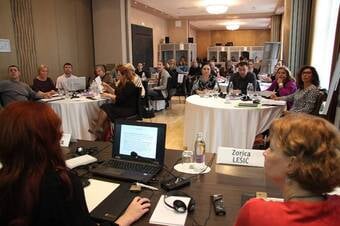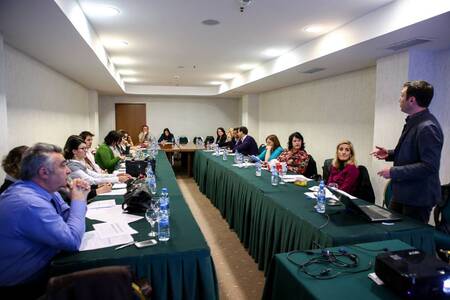 Greater parental involvement, developing a more holistic teaching approach, ensuring constant capacity building of the school and teaching staff and improved monitoring and evaluation of the inclusiveness in schools. These are some of the regional policy recommendations that the members of the PolicyNet working group on secondary education in South Eastern Europe identified as priorities on the first meeting of the group in Ljubljana, Slovenia on 16-18 October 2014.
Greater parental involvement, developing a more holistic teaching approach, ensuring constant capacity building of the school and teaching staff and improved monitoring and evaluation of the inclusiveness in schools. These are some of the regional policy recommendations that the members of the PolicyNet working group on secondary education in South Eastern Europe identified as priorities on the first meeting of the group in Ljubljana, Slovenia on 16-18 October 2014.
These recommendations were extracted out of the evidence based suggestions coming from the Baseline study on inclusive policies and practices and should later on result in policy amendments.
The participants of the meeting also had the chance to get a deeper insight into Slovenia’s experience through study visits to several secondary schools in the country, so that they could see for themselves how inclusive education is put into practice, in this particular country.
Snežana Vuković, member of the Steering Board and Policy Team, from Serbia, was impressed with what she saw at the Second Gymnasium in Maribor.
“The school has such a holistic approach, that the students’ orientation to high achievement does not eliminate the need for emotional and social support to young people who are separated from their families, who experience the cultural differences, and often do not speak Slovenian. Commitment is present at every step. One teacher said: We, as a community are better, because we have them!”, she says
Borislava Maksimović, Focal Point for Serbia went to the School Centre in Ljubljana where as she says saw a lot of great energy and lots of ideas.
“Students recognize how the school invests in them, so they give back. They are accepted well by all with great care. Attentiveness on each step is present within the school and also with those who come as guests. The same goes probably for the children’s parents too. The motto of our Regional project reflects what can be seen in this school!”, noted Maksimović.
You can download here meeting documents:
- Meeting agenda
- Meeting objectives and expected results by Zorica Lešic, Project officer, Council of Europe
- Inclusive SchoolNet updates by Marijana Todorovic, Project officer, Council of Europe
- Key findings from the LSE Baseline Study and NEPC focus groups
- Inclusive TeacherNet update: results from the mapping report by Eljona Elmazi, Project officer, Council of Europe
- Preparation for the Study visit: Slovenian general secondary education & National education institute by Branko Slivar, Head of Secondary Education, National Education Institute, Slovenia
- The National Education Institute of Slovenia - NEI by Brigita Žarkovic Adlešic, Head of Proffesional Development, National Education Institute, Slovenia
- Guidance for the integration of immigrant children at kindergartens and schools by Marta Novak, Senior Consultant, National Education Institute, Slovenia
- Links between Policy and Practice - Initial pilot school projects and policy recommendations by Maria Golubeva, expert
- PolicyNet working group on general secondary education : Draft regional policy recommendations








 Improving the enforcement mechanisms of laws and policies, financial affordability and cost-effectiveness of inclusive education, avoiding politicization of inclusive education, cooperation of education with social care systems, etc. are among the relevant issues that will be discussed by the network.
Improving the enforcement mechanisms of laws and policies, financial affordability and cost-effectiveness of inclusive education, avoiding politicization of inclusive education, cooperation of education with social care systems, etc. are among the relevant issues that will be discussed by the network.
 When Gordana Nestorovska went to primary school, there was no inclusive education whatsoever, not even discussion about it. Children with special needs went to special, completely different schools that the ones she attended. They were not included in regular classes and there was no debate on how to help them.
When Gordana Nestorovska went to primary school, there was no inclusive education whatsoever, not even discussion about it. Children with special needs went to special, completely different schools that the ones she attended. They were not included in regular classes and there was no debate on how to help them.